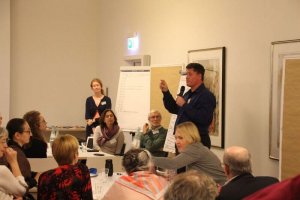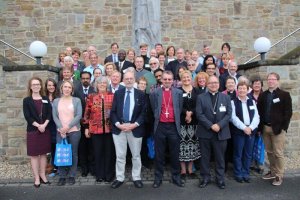A young refugee, who fled Afghanistan to avoid being forced into jihadi conflict, has given a moving account of his life’s journey to a major Anglican consultation held this week in Germany.
Aged just 15, ‘Binyamin’ (not his real name) fled to Europe, where he spent the next eight years being bounced from one country to another, his asylum applications repeatedly rejected.
It was when he finally he visited a church-based refugee centre that he was connected with a proper asylum lawyer and was given official status in just two weeks. At last he could settle and begin his life again.
‘Binyamin’ was speaking at a consultation on church responses to refugees and migrants held in Cologne, Germany and hosted by the Church of England Diocese in Europe, in collaboration with the Anglican Alliance and the Anglican mission agency USPG.
Participants came from 18 European countries, from North Africa and the USA: from the Diocese in Europe, the Episcopal Convocation in Europe, the Church of England, the Church in Wales, the Diocese of Cyprus and the Gulf, and The Episcopal Church. They were joined by ecumenical partners and by three refugees, who greatly enriched the meeting.
Each participant had a profound story to tell of their church’s response to refugees and migrants in their midst, and of the transformation in their church life through welcoming and journeying with the ‘stranger’.

Participants in Cologne
The consultation was conscious that the situation in Europe was only part of the wider global emergency. Janette O’Neill, Chief Executive of USPG, said: “We are facing a global crisis, with 65 million people worldwide currently displaced and seeking safety outside or within their own country. Of this number, 1.3 million came to Europe last year. In response, Anglican churches have been doing amazing work to support these refugees.”
Doris Peschke, General Secretary of the Church Commission for Migrants in Europe, emphasised this point, pointing out that 27 European countries are together hosting about the same number of refugees as the tiny country of Lebanon hosts alone. “This is not a crisis in Europe,” Doris said. “We just need to equip the system and not undermine asylum systems in Europe.”
“Churches are ideally placed to assist in integration. Local people can accompany refugees and migrants to help them to participate in local life,” Doris added.
José Riera-Cézanne, Special Advisor to the United Nations High Commissioner for Refugees, also highlighted the key role for churches and other faith communities. Speaking to the consultation via a weblink, José said: “The international development and humanitarian communities are increasingly recognizing the role of faith in providing significant moral, social and political agency for human development and resilience in the face of hardship and adversity. This has been accompanied by recognition that faith leaders, religious institutions, communities of faith, and faith-based NGOs are carrying out critical development and humanitarian relief activities, including in situations of entrenched conflict.”
The examples of such activities by churches, shared through case studies at the consultation, were as varied as they were inspirational:
- In Greece, churches have worked ecumenically to provide assistance to vulnerable refugees and migrants, long before larger aid agencies were operational.
- In Finland, an Anglican priest, himself a refugee from South Sudan, is supporting other refugees, helping them through his own experiences.
- In Brussels, a church member opened her home to a destitute Afghan family – and continues to host them every few weeks for a break from life in the camp.
- In Rome, the long-standing Joel Nafuma Refugee Centre, based at an Episcopal church, accompanies refugees on their journey through asylum processes to a place of belonging and independence in society.
- In Turkey, a local church began a small initiative providing milk and other basic needs which now connects them regularly to 150 refugee families.
- In Italy, the St Egidio Community has worked with the Government and ecumenical partners already to bring 1000 vulnerable Syrian refugees from Lebanon directly to Italy using the legal instrument of the ‘humanitarian corridor’, available to all EU countries.
- In Canterbury, the Diocese links with church and partner agencies in Calais in advocacy and practical responses, especially in supporting government services in receiving unaccompanied asylum-seeking children.
What distinguished all these positive stories was that they build on the skills, talents and assets of local churches. Allison Duvall, Program Manager for Church Relations at Episcopal Migration Ministries (EMM), shared how her organisation uses this ‘asset-based’ approach in working with local congregations and matching their gifts to the needs of refugees and local refugee settlement agencies. She described these as gifts of head (learned skills), hand (practical skills) and heart (empathy and caring), and of human (other partners in the community).
Allison said that helping congregations to discern their gifts is to “frame conversation around hope,” enabling people to realise that “my gifts can make people feel welcome.”
The consultation looked realistically at the challenges as well as ways to make church responses more effective. The Diocese in Europe bishops, who hosted the meeting, both highlighted their concerns about growing nationalism and xenophobia.
Bishop Robert Innes commented: “Migration has hit the European Union in the wake of a deep financial crisis. Many people in Europe are suffering austerity.” This, he said, has created an extremely difficult situation. Yet as churches “we have more assets and talents than we might have supposed”, he added.

The group in Cologne
Bishop David Hamid challenged churches to “gently correct the narrative” and to challenge in preaching and teaching “the growing toxic narrative around the world” which feeds fear and resentment of refugees and migrants. “One of the strengths of churches is that we are a flexible body, because we have no charter or mandate other than to love God and love our neighbour, so we can go where others cannot go and fill the gap.”
Insights gained during the consultation included the idea that as churches reach out to welcome the stranger, what starts as a transactional encounter, such as giving food and clothing, develops and deepens into a transformational relationship – a friendship, in which both host and guest are blessed.
Also, local churches are well placed as a networker, mapping and connecting refugees to local services, faith based and secular. Churches can also provide a ‘safe space’, where the various agencies and others actors can meet to share and plan.
Revd Rachel Carnegie, Co-Executive Director of the Anglican Alliance, highlighted another insight: “Many case studies talked about discerning and encouraging gifts – the skills and talents in refugees as well as gifts in the host congregation – which all come together into a community of mutual flourishing. This is an example of the asset-based approach to church and community mobilisation, which the Anglican Alliance is seeing bear great fruit all over the Communion.”
Rachel added: “It has been a privilege for the Anglican Alliance to walk alongside the Diocese in Europe and USPG in this consultation and an inspiration to hear so many accounts of dynamic and compassionate responses by local churches despite the profound challenges of the situation.”
Following the consultation, the Anglican Alliance hosted a webinar to share the learning with a wider audience. The webinar recording is available to listen to online.
The Anglican Alliance will prepare a report on the consultation and will also continue to share learning between the many provinces around the Anglican Communion who are hosting refugees. As the consultation was reminded, 90% of refugees and displaced peoples around the world live in developing nations. And churches around the Anglican Communion have a worthy record of responding to the gospel call to ‘welcome the stranger’.

